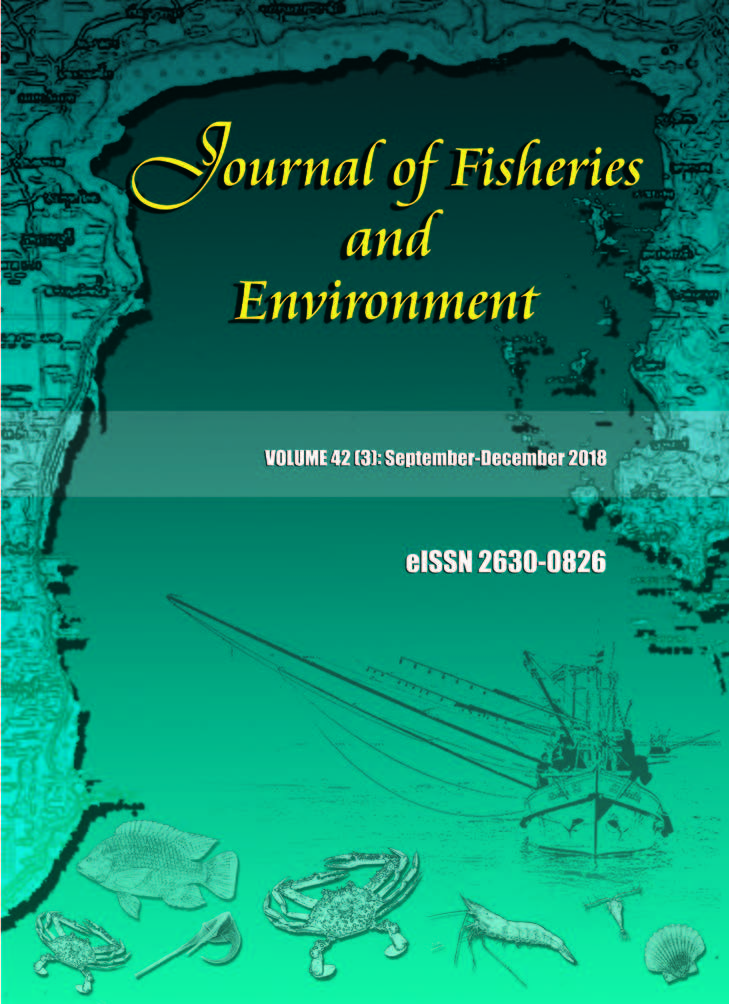Stakeholder Perception of Coral Reef Management Policy Implementation Along the Eastern Coast of Thailand
Main Article Content
Abstract
Coral reef-related tourism contributes to economic development and strengthens local community livelihood opportunities; however, it is not environmentally neutral, and it needs an integration of policy and management actions to harmonize tourism benefits and coral reef health. Thailand is among the top tourism destinations in the world, and the east coast has experienced a doubling of tourism activity in the past decade. A socio-ecological study explored the perceptions of stakeholders concerning coral reef management policy implementation in Marine Protected Areas in the Eastern Coast of Thailand. Coral reef managers and users were interviewed about their perceptions of the planning, process and outcome of coral reef management policy and regulations. Users largely felt that they were left out of the decision process in coral reef management and they are unlikely to participate in conservation activity because of the lack of communication between managers and users. The adversarial perceptions between managers and users possibly undermine the success of coral reef management. Managers perceived gaps between institutional policies and implementation priorities, which frequently deprioritized conservation. This study suggests that success of marine resource management needs comprehensive policy together with close communication between managers and end users to get strong support from local communities.
Article Details
References
2. Bessell-Browne, P., A. P. Negri, R. Fisher, P. L. Clode, A. Duckworth and R. Jones. 2017. Impacts of turbidity on corals: The relative importance of light limitation and suspended sediments. Marine Pollution Bulletin 117: 1–24.
3. Boone, H. N. and D. A Boone. 2012. Analyzing likert data. Journal of Extension 50(2). https://www.joe.org/joe/2012april/tt2p.shtml[8/20/2012.
4. Carr, M. H., J. E. Neigel, J. A. Estes, S.Andelman, R. R. Warner and J. L. Largier. 2003. Comparing marine and terrestrial ecosystems: Implications for the Design of Coastal Marine Reserves. Ecological Applications 13(1): 90–107.
5. Chansang, H., U. Satapoomin and S. Poovachiranon. 1999. Map of Coral Reefs in Thai Waters. Vol. 1: Gulf of Thailand. Department of Fisheries, Bangkok. 284 pp.
6. Dinsdale, E. A. and V. J. Harriott. 2004. Assessing anchor damage on coral reefs: a case study in selection of environmental indicators. Environmental Management 33(1): 126-139.
7. Eklund, J. and M. Cabeza. 2017. Quality of governance and effectiveness of protected areas: crucial concepts for conservation planning. Annals of the New York Academy of Sciences 1399(1): 27-41.
8. Gell, F. R. and C. M. Roberts. 2003. Benefits beyond boundaries: the fishery effects of marine reserves. Trends in Ecology & Evolution 18(9): 448-455.
9. Hannak, J. S., S. Kompatscher, M. Stachowitsch and J. Herler. 2011. Snorkelling and trampling in shallow-water fringing reefs: risk assessment and proposed management strategy. Journal of Environmental Management 92(10): 2723-2733.
10. Hockings, M., S. Stolton, F. Leverington, N. Dudley, and J. Courrau. 2006. Evaluating Effectiveness: A framework for assessing management effectiveness of protected areas. 2nd edition. IUCN, Gland, Switzerland and Cambridge, UK. 105 pp.
11. International Association for Public Participation. 2017. Public participation spectrum. https://www.lgnsw.org.au/files/imce-uploads/346/IAP2-Public-Participation-Spectrum-LGNSW-Amalgamation-Toolkit.pdf.
12. Kim, K., M. Uysal and M. Joseph Sirgy. 2012. How does tourism in a community impact the quality of life of community residents?. Tourism Management 36: 527–540.
13. Leverington, F., M. Hockings, M. Pavese, K. L. Lemos and J. Courrau. 2008. Management effectiveness evaluation in protected areas - a global study. Supplementary Report No.1: Overview of Approaches and Methodologies. The University of Queensland, Gatton, TNC, WWF, IUCN-WCPA, Australia. 145 pp.
14. Lopes, P. F. M., S. Pacheco, M. Clauzet, R. A. M. Silvano, and A. Begossi. 2015. Fisheries, Tourism, and Marine Protected Areas: Conflicting or Synergistic Interactions ?. Ecosystem Services 16: 333-340.
15. Lunn, K. E., and P. Dearden. 2006. Fishers’ needs in marine protected area zoning: a case study from Thailand. Coastal Management 34(2): 183–198.
16. McClanahan, T. R., N. A. Muthiga, C. Abunge, A. T. Kamukuru, E. Mwakalapa and H. Kalombo. 2015. What happens after conservation and management donors leave? a before and after study of coral reef ecology and stakeholder perceptions of management benefits. PLoS ONE 10(10). E0138769. doi:10.1371/journal.pone.0138769
17. Milazzo, M., I. Anastasi and T. J. Willis. 2006. Recreational fish feeding affects coastal fish behavior and increases frequency of predation on damselfish Chromis chromis Nests. Marine Ecology Progress Series 310: 165–172.
18. Pomeroy, R. S. and A. Cruz-Trinidad. 1996. Socioeconomic aspects of artisanal fisheries in Asia. In: Perspectives in Asian Fisheries, A volume to Commemorate the 10th Anniversary of the Asian Fisheries Society 239–258 pp. World Fish, Malaysia.
19. Reopanichkul, P., T. A. Schlacher, R. W. Carter and S. Worachananant. 2009. Sewage impacts coral reefs at multiple levels of ecological organization. Marine Pollution Bulletin 58(9): 1356–1362.
20. Reopanichkul, P., R. W. Carter, S. Worachananant and C. J. Crossland. 2010. Wastewater discharge degrades coastal waters and reef communities in southern Thailand. Marine Environmental Research 69(5): 287–296.
21. Russi, D., M. Pantzar, M. Kettunen, G. Gitti, K. Mutafoglu, M. Kotulak and P. ten Brink. 2016. Socio-Economic Benefits of the EU Marine Protected Areas Institute for European Environmental Policy. Report prepared by the Institute for European Environmenttal Policy (IEEP) for DG Environment.
22. Siriwong, S., J. D. True and S. Piromvarakorn. 2019. Number of tourists has less impact on coral reef health than the presence of tourism infrastructure. Songklanakarin Journal of Science and Technology. In press.
23. SPSS Inc. 2002. SPSS for Windows, Version 11.5. Chicago, SPSS Inc.


